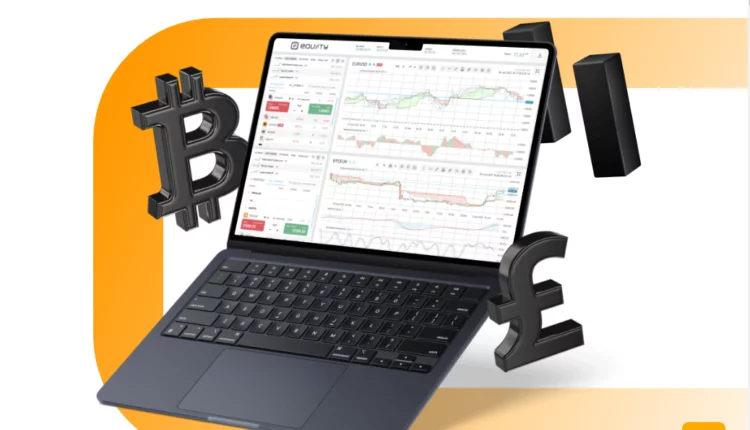
Equiity is a digital trading platform. It offers products in various markets like commodities, Equiity, cryptocurrencies, and Foreign Exchange. Equiity aims to be a hub for different types of traders. Equiity is an online trading platform based in Mauritius that offers CFD trading services on a variety of financial instruments including stocks, forex, commodities, and cryptocurrencies. The platform has earned a solid reputation for its advanced trading features and user-friendly interface.
The broker’s website, www.equiity.com, is owned and operated by MRL Investments (MU) Ltd, registered in Mauritius under registration number 187076GBC.MRL Investments (MU) Ltd holds FSC license number GB21027168 and is located on the 7th Floor, Tower 1, NeXTeracom, Cybercity Level 72201 Mauritius. In addition, MRL Investments (CY) Ltd acts as the paying agent for MRL Investments (MU) Ltd and is duly registered in Cyprus with registration number HE443296. The registered office is Chrysanthou Mylona 1, Panayides Building 3rd Floor, Flat/Office 1, 3030 Limassol, Cyprus. MRL Investments (CY) Ltd facilitates the provision of payment services to MRL Investments (MU) Ltd.
User Interface and Experience:
The equiity home page is characterized by its simplicity. Scrolling on the platform’s landing page shows the platform’s intent in its products and services. Equiity offers commodities trading, forex trading, index trading, stock trading, metals trading, and cryptocurrency trading.
The platform has a comprehensive algorithm that facilitates the trading of products such as Contracts for Difference (CFD). CFD is a legally binding contract that creates, defines, and governs mutual rights and obligations between two parties, commonly referred to as “buyer” and “seller”, and provides that the buyer pays the seller the difference between the current value of the Asset and its value at the time of the conclusion of the contract.
As its offering expands into different markets, Equiity is emerging as one of the most diverse CFD trading platforms in today’s digital economy. Here are some of the most important characteristics of Equiity:
Flexibility: Equiity is designed as a trading platform that can be used by users to trade via mobile & web apps. With a well-designed platform optimized for different environments, users generally benefit from a quality trading interface whenever they choose to trade.
Data Transparency: Equiity prides itself on a CFD trading platform that takes data transparency very seriously. The platform has policies in place that help process customer data and all transactions with a high level of transparency. The platform provides you with all the information about the transaction fees in advance. No hidden fees or commissions on winnings.
Security: The hallmark of any trading platform is the security of user data and assets. Basically, as a CFD platform, Equiity has no cash and therefore reduces the platform’s vulnerability to hackers. However, Equiity enables secure payments and the best encryption of financial transactions, achieved through firewalls, SSL software, and servers in SAS 70-certified data centers.
Educational Support: Trading volatile financial instruments can be liberating but very risky. Especially for new traders, navigating the CFD ecosystem can be very difficult and lead to many losses if you are not careful. To help its users, Equiity publishes numerous educational materials covering both the basics and the technicalities of trading. These resources are useful for both new and experienced traders.
Responsive Customer Service: Trading is a hectic business and users can get confused. Due to complex algorithms, payment processing capabilities, etc., users need reliable customer service. This is provided by Equiity as a trading platform. The platform’s customer support is available 24/7 and is very responsive. The Equiity customer support team is available via email, phone number, and live chat.
What can you trade in Equiity?
Equiity really excels at offering a diverse range of markets:
- Commodities
- Forex
- Indices
- Stocks
- Precious metals
- Cryptocurrencies
Such a range of options ensures that traders can spread their investments across multiple sectors and hedge their bets, increasing potential profitability and managing risk in an account.
Security and Regulation:
Equiity is a CFD provider and is subject to strict compliance requirements. Overall, according to the Equiity Review rating, Equiity can be considered a safe and reliable broker to trade. Here is a summary of Equiity’s security measures and regulatory approvals:
Regulation: Stocks are regulated by the Financial Services Commission (FSC) of Mauritius, which ensures that the broker complies with international financial regulations and standards.
Security of Client Funds: The brokerage firm follows strict rules regarding the segregation of client funds from the firm’s operating funds.
Security Protocols: The platform uses advanced security protocols such as 128-bit SSL encryption to ensure all customer data and transactions are completely safe and secure from hackers and other malicious acts.
Account Verification: Equiity follows a rigorous account verification process that includes identity verification to prevent fraud and unauthorized access to client accounts.
Negative Balance Protection: The platform offers negative balance protection, ensuring clients do not lose more than their account balance in the event of significant market volatility.
Payment Methods & Withdrawals
According to our detailed 2023 stock rating, the broker’s deposit and withdrawal conditions are favorable for investors. It offers a wide range of payment options and low minimum deposit requirements.
Here are the details of the equiity deposit and withdrawal conditions:
Deposit Methods
- Bank transfer
- Credit/Debit cards
- PayPal
- Neteller
- Skrill
- VPay
Deposit Fees
Equiity does not charge any deposit fees.
Minimum Deposit Amount
The minimum deposit required to open a trading account is $250.
Withdrawal Methods
- Bank Transfer
- Credit/Debit Cards
- Paypal
- Neteller
- Skrill
Withdrawal Fees
Fees may apply to certain withdrawal methods. However, the broker does not list the commissions for each method on their website.
Delay in Processing Payments
Equiity generally processes payments within 24 hours. However, actual processing time may vary depending on the recipient’s bank and payout method.
Customer Support:
Equiity offers excellent customer service to its customers. The platform offers email, phone, and live chat support, with a support team available 24/7. To contact Equiity Customer Support:
Live chat
Email: [email protected]
Phone number: +971525353542, +41225087362
Equiity Accounts
The broker offers its clients three live trading accounts, a free demo account, and an Islamic account. Here is an overview of the features of each trading account offered:
Demo Trading Account
- Free
- Provides access to all trading tools and features through virtual means.
- Perfect for new traders who want to test their trading strategies and get familiar with the platform.
Islamic Account
- Available for all live trading accounts
- Adheres to Sharia rules on Islamic finance
- No roll/swap fees for overnight positions
- Suitable for traders who profess the Islamic faith and wish to trade without violating their religious beliefs.
Silver Account
- Minimum Deposit: $250
- Execution Modes: MT4NCC, MT4 Fixed, MT4NDD, MT4 Cent
- Base currency: USD, EUR, GBP
- Average execution speed: 0.08
- Spreads: Start at 2.5 cores
- Maximum Leverage: 1:200
- Islamic Account: available
- Fifth Decimal
Gold Account
- Minimum deposit: $250
- All the benefits of a silver account
- Average execution speed: 0.06
- Spread: 20 pips (50% discount)
- News notification
- Dedicated account manager
- Webinars and videos
- 25% off SWAP
Platinum Account
- Minimum deposit: $50,000
- All the benefits of Silver and Gold accounts
- Average execution speed: 0.08
- Spread: 18 pips (75% discount)
- Maximum Leverage: 1:500
- 50% discount on exchange
Pros:
The equiity platform is designed to be faster and easier than its counterparts. This simplicity is one of the most visible advantages of the platform. As per the list of benefits listed, Equiity users have access to:
- Trading terminals with robust features
- Solid spreads
- Unique lever skills
- Diversified range of CFD assets and;
- Custom trading accounts
To give users the widest possible access to their platform, Equiity also supports a wide range of payment methods. These payment methods include Mastercard, Skrill, Neteller, Visa, and Maestro, among others.
Cons:
- Unavailability of a dedicated mobile application
- MT4 or MT5 Not available
Bottom Line
After extensive research for Equiity Review, it is clear that the broker is a reliable and trustworthy choice to trade in the market. The extensive list of available trading tools and options helps clients make informed decisions, including advanced research and analysis tools, extensive research resources, and bespoke portfolio management services setting up the broker.
One of the most notable features of this broker is its user-friendly online platform, which allows clients to easily access and manage their trades anywhere, anytime. Overall, Equiity Broker has proven to be a reputable brokerage firm that can help people achieve their trading goals. You too can get started with a live account in 2 minutes.
बिटकॉइन क्या है ?
April 27, 2024Bitcoin Wallets: Which One Is Right for You
September 28, 2023
Comments are closed.
Bitcoin News
-
बिटकॉइन क्या है ?
April 27, 2024
Most Viewed
-
बिटकॉइन क्या है ?
April 27, 2024











